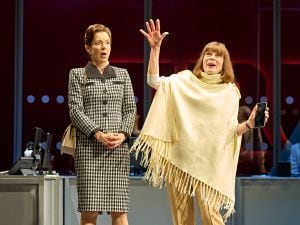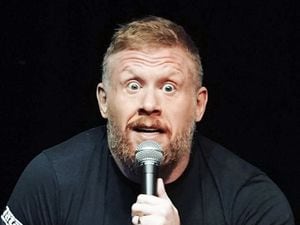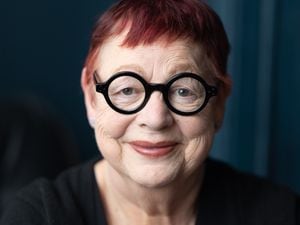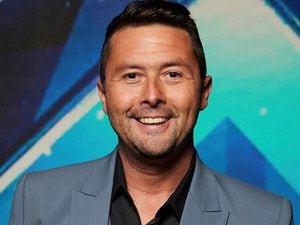King of stand up on road again: Russell Howard talks ahead of Birmingham shows
We catch up in Edinburgh, where Russell Howard is playing to modest audiences.
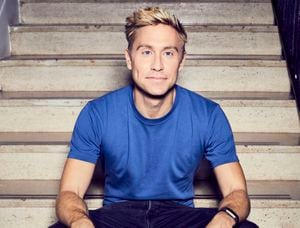
Not tonight the mega domes that are a home-from-home when the rock star stand up is on the road. Those will come later, further down the road when he’s honed his new live act and is firing on all cylinders.
Tonight is about getting ready to be brilliant, about preparing to be exceptional, about making sure it’ll be alright on the night. Though the crowds are smaller, Howard’s dial is turned to ten. There’s no sense of complacency nor of taking things easy. He’s determined to smash it, even though the stakes are small.
He’s been coming to Edinburgh for longer than he cares to remember; back in 2006 the comedian, TV presenter and actor was nominated for an if.comedy award for his Edinburgh Festival Fringe show. Today, in a city filled with comics, he remains the biggest draw. Though his new show, Respite, is as-yet-unfinished, there are queues out of the door as people try to snap up tickets.
Howard is excited about what’s to come. His RESPITE tour has proved so popular that he’s had to add extra dates; including one at Birmingham’s Resorts World Arena on September 18, which is followed by a previously-announced headline there on September 22, which has long since sold out.
“I’m chomping at the bit,” he says. “I’ve been working on the show since April. I’ve literally been working on it every day then doing two or three shows a week.”
And now it’s taking shape. He hit the road at the start of September for a colossal tour that takes him around the world. After his UK dates, he’ll head over to Europe to play in Germany, Scandanavia, Holland, Hungary and Budapest before flying out to Canada and working his way into the United States of America. There’ll be a week of shows back in the UK next summer, further preparation for the Australian leg, which takes him from Brisbane and Sydney to Melbourne, Adelaide and Perth. More shows following in New Zealand before Howard boards a plane back to England and wraps it up in London, one year hence. He’ll be living out of a suitcase and seeing his name up in lights for 12 months flat.
He’s happy to put in the hard yards before taking a show on the road. The constant process of refinement is what makes or breaks a gig.
“You just have to put the work in, there’s no alternative. “I was talking to a mate who’s a musician about this. And we decided not doing the groundwork would be the equivalent of James Bay saying: ‘Look, I’ve got this great song, let’s call it Hold Back The Fog. No, no: Hold Back The Cloud’. You just wouldn’t do that. It’s Hold Back The River. You have to work hard to get it right.”
The show that fans will see when Howard hits the West Midlands will be the result of frequent and numerous intimate gigs in clubs up and down the UK. He views the audience as being as important to the writing process as he is himself.
“Comedians create with the audience. It’s a beautiful process of doing loads of small gigs and the audience let you know through laughter where to stop or where to go further down the path. Sometimes they are completely wrong and at other times they are completely right. Building a show with them on board is the only way to do it. You can’t arrive at a 2,000 or 11,000-seater and rock up expecting it to be great. You have to work at it.”
Respite won’t be Howard’s first world tour. The man who was inspired by Lee Evans, Richard Pryor and the Black Country’s very own Frank Skinner sold out his 2011 arena tour, Right Here Right Now before taking the 2013 follow-up, Wonderbox, to Britain, Ireland, the United States, Australia and New Zealand. He went one better in 2017 with Round The World, where he memorised the capital city of every country in the world alphabetically in order to recite the full list at the start of each performance.
The planning for such a huge adventure begins in the simplest of ways: with his iPhone.

“Since the last tour, I’ve basically been writing lots of notes in my phone. In April, I went through all the notes and some of it was madness. Eggs – bacon – milk – oh it’s a shopping list, it’s got nothing to do with the new show. Some of the ideas don’t make sense. Some of them provide the sparks to go off and create something really funny. And then things happen in the news and I write about those, or about things that happen in my own life.”
The hardest thing is getting the first 20 minutes. “That’s the biggest challenge. Once you’ve got that, you can start doing clubs. Then you can drop 10 minutes of what you’d planned and try a new 20.”
And so, since spring, Howard has been plying his trade at comedy clubs small enough to double as a barber’s. “It’s not just me. That’s what the circuit’s like in London. You’ll catch Jack Whitehall or Micahel McyIntyre if you look out for them; everyone does it.”
The acid test for Howard couldn’t be more straightforward. “It’s got to make me laugh, that’s the key. Sometimes I’m baffled that audiences don’t laugh at things that I think are really funny, but when that happens and the crowd just isn’t into it then I have to accept it and move on. You can’t be pig-headed about it. Conversely, some of the stuff you don’t think is funny goes down brilliantly.”
And then he sticks it all together and takes it up to Edinburgh. That’s his pre-season training. That’s where he has to get match fit.
Being on the road is no hardship. Though he’s happily domiciled in London with his wife Cerys, a doctor, and their dog, a Jack Russell Terrier named Archie, he’s just as content when he’s away. Howard got married in June and this will be his first outing since the big day. Respite is even bigger than the shows that have gone before, the result of his hugely successful Netflix show Recalibrate. While comedy show staples like Mock the Week and Never Mind the Buzzcock as well as his own TV programs like The Russell Howard Hour made him huge in the UK, Howard has become increasingly popular elsewhere. His Netflix show persuaded promoters to stick him on for three shows at New York’s Gramercy Theatre and those did so well that he’s moving through the gears into bigger venues.
“The Netflix special did so well that I tripled my audience, basically. So now I can work in America and Europe and India, which is great. You get one life and these opportunities are amazing. The opportunity to do a comedy club in Mumbai, for instance, is incredible. My wife is a doctor and she’s taking a sabbatical while I’m on the road so that we can do the tour together. It’ll be pretty full on for us and she’s never toured with me before, but I can’t wait.”
There are times when he has to adjust his material to make it palatable to local audiences. What might work in Birmingham, for instance, may not play so well in Bangalore or Budapest. “That’s very true. But I write it broadly, so I don’t go into too many details about Hobnobs and Rich Tea, because that wouldn’t play well in San Francisco. But then some of the audiences do surprise me. I did a gig in Washington and a lady in the audience shouted out for the meerkat routine. The fact that she’d watched the stuff online blew my mind. Youtube and the internet mean people are so connected and aware of everything.”
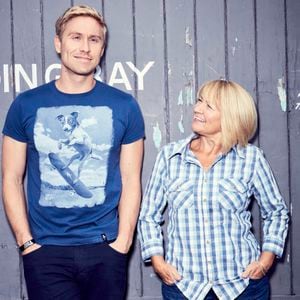
They are indeed, though nothing connects strangers as beautifully as laughter. It doesn’t matter what side of the political divide people are on, or what religious beliefs they might have; Howard has only to get them laughing and their differences melt away.
“America is a very divided place and we’ve been out to different parts of the States, some that are Trump states; real Republican Heartlands. And you can play those venues where there are people who are opposed ideologically to other audiences. But get them laughing and everyone comes together. I find that such a powerful thing. Comedy is much maligned but laughter binds people together. Getting a room full of people and making them laugh is not for nothing. It does something. Britain is divided too. If you go into a room and talk about Brexit one way, you’ll have half the crowd cheering and half going the other way. But if you get people to laugh, you start to heal that divide, whether you are pro or anti. You laugh at the absurdity of it all.”
Travelling also broadens Howard’s perspective. During a tour in India, for instance, he found himself in a Mumbai slum, where he was invited to watch a children’s acting course. He was fascinated by the difference in culture. For one thing, the equivalent kids in the West would be hoarding clutter at an early age – stuff their counterparts in Mumbai would kill for. “One thing that stood out was when we went to a temple that was overrun with rats. The people there believed those rats were relatives who had been reincarnated. I have literally never been so intimidated in all my life. There’d be a rat running past and I’d want to stand on its head – then I’d look at my guide and think: ‘I can’t; that rat might be his grandad’.”
Though the next year is all about touring, Howard remains a huge fan of TV. He’s been doing it so long that it’s become second nature and he’s looking forward to new opportunities further down the road. “I’ve always been a comedian on telly rather than a TV presenter. I feel like I’m in front of an audience of one when the camera is rolling so I just chuck the stuff out as naturally as I would if I were on stage. I got quite a lot of offers to do different things like TV presenting or acting. But I’m just not good at those things: I’m good at reading the news, writing jokes and being funny. You know, we all have different skills. I was talking to Jack Whitehall the other day and I’m convinced he’s going to be this amazing massive film star, like a Hugh Grant character. He’ll be great. But that’s not me. I don’t have that in me.”
What Howard does have is an innate ability to make people laugh. He’s been doing it since he was a kid. “I was always pretty funny back then, but everyone is at school. I loved school, it was perfect preparation for Mock the Week.
“I messed about but I always hit the books when I needed to. Then I saw a Lee Evans video when I was 15 and it blew my mind. Stand up didn’t exist back then, not in the way it does now. It was all Vic and Bob or Harry Enfield, which was great for TV but which wasn’t straight stand-up.
“So my friend, Craig, showed me Lee Evans and that’s what got me started. I was literally writing jokes from age 16. I just wanted to do it. My dad is very good and a very positive role model and he just told me to give it a go. He’s always been really supportive and encouraged me to get on with it.”
Howard earned his spurs from the ages of 18 to 21 while he was at university. After lectures, he’d hit the clubs to hone his craft.
“I was doing gigs every night in Birmingham, Bristol, Plymouth. I’d play Swindon and all the provincial towns without ever getting to London. And after those three years of gigging I knew that stand-up was what I wanted to do.”
So at 21, he moved to London and gave it a go.
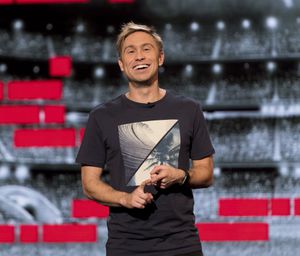
“You spend years slogging away but it’s not even slogging because there was nowhere I’d rather have been. I was doing my 10,000 hours.
“I remember a gig at 19 when a guy swung at me and I managed to dodge the punch while holding onto the mic at the same time. He was screaming something random at me that he thought I’d been having sex with his wife.
“I was 19. I wasn’t having sex with anybody.”
By the age of 22, he was good to go. “I didn’t get paid during those first three years, I was just an open spot, looking for a gig. But when I started to get paid I was convinced I’d made it. I was paying my rent at 22 with jokes. It was just the best feeling in the world. I wasn’t in a nice place but I was surviving.”
And he still is although, these days he’s in slightly more salubrious surrounds. He’s one of Britain’s best loved and most decorated comedians, though the reason for doing it remains the same – he likes to make people laugh.
“It’s not about awards or accolades. I bet it was the same for Joan Rivers or for Billy Connolly. It’s all about having a new idea that works. That’s the best. It just kicks in. You go on stage and it works and that is everything. If you lose that, then it’s time to get out of the game.”

